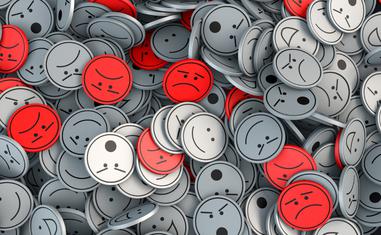The views expressed in our content reflect individual perspectives and do not represent the authoritative views of the Baha'i Faith.
Growing up, my best friend’s dad had a dark, pessimistic view of the future. He had obviously struggled in life, encountered hatred, pain, and prejudice, and didn’t like people much as a result.
I didn’t learn the word “misanthrope” until later, but its definition – someone who dislikes or distrusts all people – fit my friend’s father pretty well. I guess you could say he had a severe case of discontinuity – he felt that the evolving world didn’t live up to his expectations of what it should become. People always disappointed him.
Of course, I was a kid then, and kids normally don’t see reality that way. When you’re young, you tend to look at the world and its people through more innocent and hopeful eyes. Young people, unless they come from dysfunctional families or societies, are usually natural optimists.
But as we age, battered by the inescapable tests and difficulties of life, we can get hurt, jaded, cynical, and misanthropic. As a young boy, I thought of my friend’s dad as quite strange, but as an adult, I can understand how and why he adopted his “people are no damn good” philosophy. It came from the deep distress he suffered, the wars he witnessed, the unjust ways others commonly acted. A sensitive soul, he developed a thick emotional armor to protect himself and fend off all that distress, and it hardened him.
His pessimism had a significant cost, though. Research has shown that pessimistic people have higher incidences of anxiety, depression, sleep disorders, hostility, high blood pressure, and heart disease. My friend’s father died at an early age, a victim of many of those illnesses. Simply, his heart gave out. His son told me “My dad died of disappointment.”
RELATED: How to Be Optimistic: 7 Ways to Be More Positive
Knowing him made me realize that no one escapes suffering in this earthly existence, but also made me wonder: how can we avoid its negative impact on our characters? What can we do to retain the innate optimism and hopefulness of childhood, even after we’ve encountered the grown-up grief and pain we all inevitably experience?
Those questions have stayed with me for a very long time. So today, when I meet any adult who still seems to have an intact sense of optimism, happiness, and hope, I tend to ask “What gives you such a positive outlook on life? What is it that makes you hope for the best, and even expect it to happen?” The results of my informal survey, which I’ve conducted now for a few decades, have surprised me.
I’ve found, because I’ve asked those questions a few hundred times, that optimistic, happy, well-adjusted people tend to answer in one of two ways – either they have nurtured a belief system which gives them spiritual sustenance; or they treat their feelings of pessimism with action. Sometimes, in the happiest and most assured adults I’ve encountered, the answer is both.
1. A Belief System that Offers Spiritual Sustenance
We humans are the only beings that contemplate our own long-term future – and have a clear awareness of our eventual physical demise. This realization of our own mortality changes us. The existential psychologist and author Irvin Yalom wrote: “… our existence is forever shadowed by the knowledge that we will grow, blossom, and inevitably, diminish and die.”
Psychologists call that universal realization “death anxiety,” and many believe it underlies all anxiety. Rollo May, the psychologist and author of Love and Will, said that everyone faces life’s biggest dichotomy – finding meaning in life, while confronting the knowledge of our approaching death. He said this existential dichotomy sometimes leads to what he called “negative anxiety,” which hinders and restricts life – or alternatively, depending on our beliefs, to “positive anxiety” which leads us to a life filled with potential and meaning.
All of this hinges on what each individual believes about life and death.
The Baha’i teachings ask us to view death as a second birth – as a passage of the human spirit from the physical world to an eternal spiritual one. Baha’u’llah, the prophet and founder of the Baha’i Faith, wrote:
The first life, which pertaineth to the elemental body, will come to an end, as hath been revealed by God: “Every soul shall taste of death.” But the second life, which ariseth from the knowledge of God, knoweth no death …
Baha’is do not believe in hell. All human souls, the Baha’i teachings say, ascend to a spiritual afterlife in the next world, and experience there the fruits of their lives here in this material existence. Hell, Abdu’l-Baha said, represents a metaphor for the condition of the soul rather than a place:
Existential paradise and hell are to be found in all the worlds of God, whether in this world or in the heavenly realms of the spirit, and to gain these rewards is to attain life eternal. … And whoso is deprived of these favours, though he continue to exist after death, is accounted as dead in the eyes of the people of truth.
Abdu’l-Baha also said “Think ye of love and good fellowship as the delights of heaven, think ye of hostility and hatred as the torments of hell.” We can experience hell right here on Earth, as my friend’s father had undoubtedly done. Our own outlook, actions, and attitudes can make our lives heavenly or hellacious.
2. Treating Pessimism with Action
When the world seems like a terrible burden to bear, when war and disease and environmental degradation weigh heavily on us, when life turns sour and sad; when depression and despair lead to pessimism, we have a choice. We can react either with inaction or action.
Optimistic people, who have hope for the future, tend to see problems as potential opportunities to act. Pessimistic people, instead, see the negative aspects of those problems, whether personal or global. Because those with a pessimistic approach to life envision all the potential dangers and pitfalls on the way – and because the fear of death underlines each one of those dangers – pessimists rarely have much hope for the future. That’s why pessimists often remain passive when they encounter a challenge.
So we can try, as many pessimists do, to isolate ourselves from the world’s meanness, stay away from others, and withdraw into a dark shell – or we can take action to counter those feelings of hopelessness. Simply, we can hide under the covers or get up and do something hopeful.
Multiple scientific studies have shown that selfless, altruistic action can counter and even cure pessimism. The New York Times recently reported on one such research project, a five-year study of 846 people in Detroit, which concluded that stressful life events “took a greater toll on people who were less helpful to others – while helping others seemed to erase the detrimental physical effects of stressful experiences.” The Baha’i teachings reached that same conclusion long before such studies were ever conducted. Baha’u’llah wrote:
Do not busy yourselves in your own concerns; let your thoughts be fixed upon that which will rehabilitate the fortunes of mankind and sanctify the hearts and souls of men. This can best be achieved through pure and holy deeds, through a virtuous life and a goodly behavior.
In his writings, Abdu’l-Baha gave the same advice:
Let them at all times concern themselves with doing a kindly thing for one of their fellows, offering to someone love, consideration, thoughtful help.
When we act altruistically and selflessly for the benefit of others – regardless of whether we’re feeling pessimistic or optimistic – we move the focus from our own inner landscape to a larger lens. If we assist others with their problems, our own problems diminish in importance. Also, the very act of doing something positive increases positivity and optimism, which allows us to bear our own burdens of hardship and suffering more easily and equitably.
RELATED: How Do Baha’is Stay Positive Amid Such Worldwide Gloom?
In 1910, Abdu’l-Baha reportedly gave this spiritually and psychologically astute advice to a German physician, Dr. Josephine Fallscheer, when she asked him what she could do in the face of humanity’s overwhelming problems:
… if you are so angry, so depressed and so sore that your spirit cannot find deliverance and peace even in prayer, then quickly go and give some pleasure to someone lowly or sorrowful, or to a guilty or innocent sufferer! Sacrifice yourself, your talent, your time, your rest to another, to one who has to bear a heavier load than you.
A year later, during his sojourn in London, Abdu’l-Baha remarked on the dire conditions England’s poorest citizens suffered from, and advised:
You must turn attention more earnestly to the betterment of the conditions of the poor. Do not be satisfied until each one with whom you are concerned is to you as a member of your family. Regard each one either as a father, or as a brother, or as a sister, or as a mother, or as a child. If you can attain to this, your difficulties will vanish, you will know what to do. This is the teaching of Baha’u’llah.
Altruistic action, then, has the power to banish difficulties and depression. Anyone who feels pessimistic about the condition of the world can simply find a place to volunteer, giving of their time and energy for the benefit of humanity. Those who do will exchange an unhealthy pessimism for a happier, more spiritual outlook.

















Comments
Sign in or create an account
Continue with Facebookor